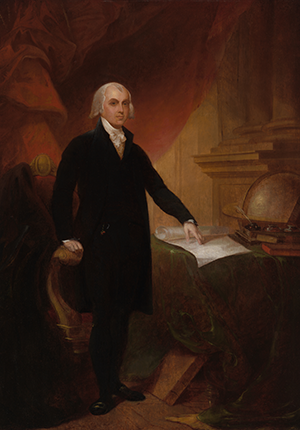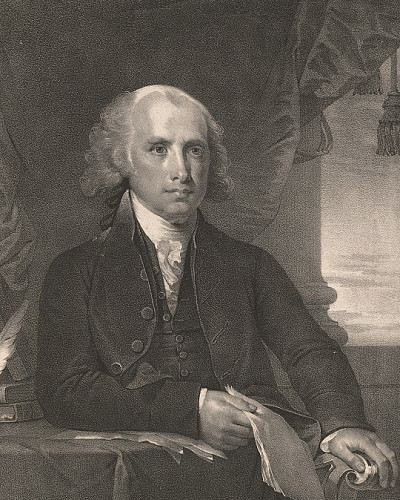Historic Document
Vices of the Political System of the United States (1787)
James Madison | 1787

National Portrait Gallery, Smithsonian Institution; gift from the Trustees of the Corcoran Gallery of Art (Gift of Frederic Edwin Church)
Summary
 Madison drafted these notes in advance of the Constitutional Convention of 1787 (April 1787). We find the arguments initiated here repeated in speech at the Convention and systematically elaborated in Federalist 10. Central to the arguments are the observations (1) that the centrifugal tendency of the states under the Confederation undermine the possibility of good government and (2) that the advantage of a larger political union in dispelling factionalism is lost in the context of the primacy of majority control in states with no higher authority to restrain them.
Madison drafted these notes in advance of the Constitutional Convention of 1787 (April 1787). We find the arguments initiated here repeated in speech at the Convention and systematically elaborated in Federalist 10. Central to the arguments are the observations (1) that the centrifugal tendency of the states under the Confederation undermine the possibility of good government and (2) that the advantage of a larger political union in dispelling factionalism is lost in the context of the primacy of majority control in states with no higher authority to restrain them.
Selected by

William B. Allen
Emeritus Dean of James Madison College and Emeritus Professor of Political Science at Michigan State University

Jonathan Gienapp
Associate Professor of History at Stanford University
1. Failure of the States to comply with the Constitutional requisitions. This evil has been so fully experienced both during the war and since the peace, results so naturally from the number and independent authority of the States and has been so uniformly exemplified in every similar Confederacy, that it may be considered as not less radically and permanently inherent in than it is fatal to the object of the present system.
2. Encroachments by the States on the federal authority. Examples of this are numerous and repetitions may be foreseen in almost every case where any favorite object of a State shall present a temptation. Among these examples are the wars and treaties of Georgia with the Indians. The unlicensed compacts between Virginia and Maryland, and between Pena. & N. Jersey—the troops raised and to be kept up by Massts.
3. Violations of the law of nations and of treaties. From the number of Legislatures, the sphere of life from which most of their members are taken, and the circumstances under which their legislative business is carried on, irregularities of this kind must frequently happen….The causes of these irregularities must necessarily produce frequent violations of the law of nations in other respects….
4. Trespasses of the States on the rights of each other. These are alarming symptoms, and may be daily apprehended as we are admonished by daily experience….
Paper money, instalments of debts, occlusion of Courts, making property a legal tender, may likewise be deemed aggressions on the rights of other States. As the Citizens of every State aggregately taken stand more or less in the relation of Creditors or debtors, to the Citizens of every other State, Acts of the debtor State in favor of debtors, affect the Creditor State, in the same manner as they do its own citizens who are relatively creditors towards other citizens…
The practice of many States in restricting the commercial intercourse with other States, and putting their productions and manufactures on the same footing with those of foreign nations, though not contrary to the federal articles, is certainly adverse to the spirit of the Union, and tends to beget retaliating regulations, not less expensive and vexatious in themselves than they are destructive of the general harmony.
5. Want of concert in matters where common interest requires it. This defect is strongly illustrated in the state of our commercial affairs. How much has the national dignity, interest, and revenue, suffered from this cause? …
6. Want of Guaranty to the States of their Constitutions & laws against internal violence. The confederation is silent on this point and therefore by the second article the hands of the federal authority are tied. According to Republican Theory, Right and power being both vested in the majority, are held to be synonimous. According to fact and experience a minority may in an appeal to force, be an overmatch for the majority. 1. if the minority happen to include all such as possess the skill and habits of military life, & such as possess the great pecuniary resources, one-third only may conquer the remaining two- thirds. 2. one-third of those who participate in the choice of the rulers, may be rendered a majority by the accession of those whose poverty excludes them from a right of suffrage, and who for obvious reasons will be more likely to join the standard of sedition than that of the established Government. 3. where slavery exists the republican Theory becomes still more fallacious.
7. want of sanction to the laws, and of coercion in the Government of the Confederacy. A sanction is essential to the idea of law, as coercion is to that of Government. The federal system being destitute of both, wants the great vital principles of a Political Constitution. Under the form of such a constitution, it is in fact nothing more than a treaty of amity of commerce and of alliance, between independent and Sovereign States.
8. Want of ratification by the people of the articles of Confederation. In some of the States the Confederation is recognized by, and forms a part of the Constitution. In others however it has received no other sanction than that of the legislative authority. From this defect two evils result: 1. Whenever a law of a State happens to be repugnant to an act of Congress, particularly when the latter [former] is of posterior date to the former, [latter] it will be at least questionable whether the latter [former] must not prevail; and as the question must be decided by the Tribunals of the State, they will be most likely to lean on the side of the State. As far as the union of the States is to be regarded as a league of sovereign powers, and not as a political Constitution by virtue of which they are become one sovereign power, so far it seems to follow from the doctrine of compacts, that a breach of any of the articles of the Confederation by any of the parties to it, absolves the other parties from their respective Obligations, and gives them a right if they chuse to exert it, of dissolving the Union altogether.
9. Multiplicity of laws in the several States. In developing the evils which viciate the political system of the U S., it is proper to include those which are found within the States individually, as well as those which directly affect the States collectively, since the former class have an indirect influence on the general malady and must not be overlooked in forming a compleat remedy. Among the evils then of our situation may well be ranked the multiplicity of laws from which no State is exempt….
10. Mutability of the laws of the States. This evil is intimately connected with the former yet deserves a distinct notice, as it emphatically denotes a vicious legislation. We daily see laws repealed or superseded, before any trial can have been made of their merits, and even before a knowledge of them can have reached the remoter districts within which they were to operate...
11. Injustice of the laws of the States. If the multiplicity and mutability of laws prove a want of wisdom, their injustice betrays a defect still more alarming: more alarming not merely because it is a greater evil in itself; but because it brings more into question the fundamental principle of republican Government, that the majority who rule in such governments are the safest Guardians both of public Good and private rights. To what causes is this evil to be ascribed?
These causes lie
1. in the Representative bodies.
2. in the people themselves
1. Representative appointments are sought from 3 motives. 1. ambition. 2. personal interest. 3. public good. Unhappily the two first are proved by experience to be most prevalent. Hence the candidates who feel them, particularly, the second, are most industrious, and most successful in pursuing their object: and forming often a majority in the legislative Councils, with interested views, contrary to the interest and views of their constituents, join in a perfidious sacrifice of the latter to the former...
2. A still more fatal if not more frequent cause, lies among the people themselves. All civilized societies are divided into different interests and factions, as they happen to be creditors or debtors—rich or poor—husbandmen, merchants or manufacturers—members of different religious sects—followers of different political leaders—inhabitants of different districts—owners of different kinds of property &c &c. In republican Government the majority however composed, ultimately give the law. Whenever therefore an apparent interest or common passion unites a majority what is to restrain them from unjust violations of the rights and interests of the minority, or of individuals? Three motives only 1. a prudent regard to their own good as involved in the general and permanent good of the community. . . . 2dly. respect for character. However strong this motive may be in individuals, it is considered as very insufficient to restrain them from injustice. In a multitude its efficacy is diminished in proportion to the number which is to share the praise or the blame... 3dly. will Religion the only remaining motive be a sufficient restraint? It is not pretended to be such on men individually considered. Will its effect be greater on them considered in an aggregate view? quite the reverse. . . .
If an enlargement of the sphere is found to lessen the insecurity of private rights, it is not because the impulse of a common interest or passion is less predominant in this case with the majority; but because a common interest or passion is less apt to be felt and the requisite combinations less easy to be formed by a great than by a small number. The Society becomes broken into a greater variety of interests, of pursuits of passions, which check each other, whilst those who may feel a common sentiment have less opportunity of communication and concert. It may be inferred that the inconveniences of popular States contrary to the prevailing Theory, are in proportion not to the extent, but to the narrowness of their limits.
The great desideratum in Government is such a modification of the sovereignty as will render it sufficiently neutral between the different interests and factions, to controul one part of the society from invading the rights of another, and at the same time sufficiently controuled itself, from setting up an interest adverse to that of the whole Society...As a limited monarchy tempers the evils of an absolute one; so an extensive Republic meliorates the administration of a small Republic.




